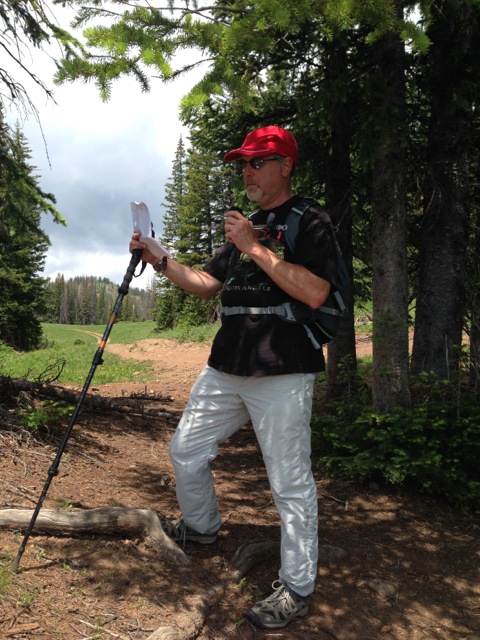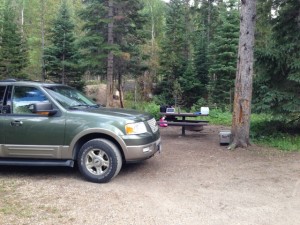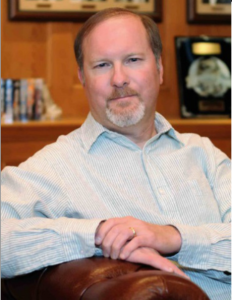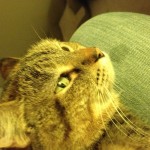A guest post by Kevin J Anderson.
 I write and publish four or more novels a year, and my creative office doesn’t have either a computer or a desk. It also doesn’t have the distraction of a constantly ringing phone, an endless succession of emails that need to be responded to (or marked as spam), doorbells to be answered with the latest UPS package of cat food from amazon prime (and the related distraction of cats who want me to feed them that food), or employees or family members who lie by assuring me “this will only take a minute.”
I write and publish four or more novels a year, and my creative office doesn’t have either a computer or a desk. It also doesn’t have the distraction of a constantly ringing phone, an endless succession of emails that need to be responded to (or marked as spam), doorbells to be answered with the latest UPS package of cat food from amazon prime (and the related distraction of cats who want me to feed them that food), or employees or family members who lie by assuring me “this will only take a minute.”
No, my real creative office is outside on the trail.
After outlining a novel, I take my notes, my digital recorder, my hiking boots, and my imagination and I hit the trail. After a few minutes, surrounded by trees, rocks, or streams, I can sink into the zone, immerse myself into my world, my story, my characters. As I walk, I think up the sentences that I would normally type out… but instead of moving my fingers around on a keyboard, I just speak the words out loud.
 I have so programmed myself to write this way that now I find it very frustrating to sit my butt in a chair and stare at a screen for hours on end. When I’m walking, I am inspired by the landscapes in my beautiful Colorado. It may not be a genuine alien world, but I can imagine that—and all without the constant real-world distractions that harass a writer cooped up in a home office.
I have so programmed myself to write this way that now I find it very frustrating to sit my butt in a chair and stare at a screen for hours on end. When I’m walking, I am inspired by the landscapes in my beautiful Colorado. It may not be a genuine alien world, but I can imagine that—and all without the constant real-world distractions that harass a writer cooped up in a home office.
The only distractions I encounter are the occasional rattlesnake or hailstorm, but I can deal with that better than tedious phone conversations.
When I’m out walking, especially on long hikes, I can sink into a fugue state, entirely into what I’m writing, and when I dictate, the words go straight from my mind and out of my mouth, recorded directly without any intermediary step. I can just reel out what’s in my imagination.
 The scenery itself is often inspirational, and when possible I try to be in a place that reminds me of what I’m writing. I’ve spent a lot of time in the Great Sand Dunes National Park in Colorado or Death Valley in California as I write my Dune novels with Brian Herbert; I’ve been in a snowstorm in the Sierra Nevada mountains while writing about Han Solo and Princess Leia on the polar icecap of a planet, and I spent time hiking around the Anasazi cliff ruins of Mesa Verde while writing about derelict alien cliff ruins in my Saga of Seven Suns.
The scenery itself is often inspirational, and when possible I try to be in a place that reminds me of what I’m writing. I’ve spent a lot of time in the Great Sand Dunes National Park in Colorado or Death Valley in California as I write my Dune novels with Brian Herbert; I’ve been in a snowstorm in the Sierra Nevada mountains while writing about Han Solo and Princess Leia on the polar icecap of a planet, and I spent time hiking around the Anasazi cliff ruins of Mesa Verde while writing about derelict alien cliff ruins in my Saga of Seven Suns.
Obviously, my hiking trips are work-related.
I have a typist (several, actually, because I tend to overload them!) who transcribes my digital file and sends me a Word document back, so that I can polish it…and there’s the tedious butt-in-chair keyboard time I am forced to endure.
 But sometimes I extend the getaway into a camping trip, so that I can really move my working office onto a picnic table out in a beautiful National Forest site. That’s where I’m writing this, sitting at a table under a lodgepole pine tree at a perfect campsite next to a river 85 miles up the Cache la Poudre canyon in northern Colorado. An extra battery for the laptop, and no internet connection, a growler of my favorite microbrew beer: It’s the perfect office, alone in the forest (except for a moose visitor who just walked through the campground), away from it all where I can concentrate on being in the worlds inside my head. It’s like taking a vacation in an exotic place with my imaginary friends.
But sometimes I extend the getaway into a camping trip, so that I can really move my working office onto a picnic table out in a beautiful National Forest site. That’s where I’m writing this, sitting at a table under a lodgepole pine tree at a perfect campsite next to a river 85 miles up the Cache la Poudre canyon in northern Colorado. An extra battery for the laptop, and no internet connection, a growler of my favorite microbrew beer: It’s the perfect office, alone in the forest (except for a moose visitor who just walked through the campground), away from it all where I can concentrate on being in the worlds inside my head. It’s like taking a vacation in an exotic place with my imaginary friends.
It’s the best office in the world.
 Guest Writer Bio: Kevin J. Anderson was born March 27, 1962, and raised in small town Oregon, Wisconsin, south of Madison—an environment that was a cross between a Ray Bradbury short story and a Norman Rockwell painting. He first knew he wanted to create fiction when he was five years old, before he even knew how to write: he was so moved by the film of War of the Worlds on TV that he took a notepad the next day and drew pictures of scenes from the film, spread them out on the floor, and told the story out loud (maybe this is what led him into writing comics nearly three decades later!). At eight years old, Kevin wrote his first “novel” (three pages long on pink scrappaper) on the typewriter in his father’s den: “The Injection,” a story about a mad scientist who invents a formula that can bring anything to life . . . and when his colleagues scoff, he proceeds to bring a bunch of wax museum monsters and dinosaur skeletons to life so they can go on the rampage. At the age of ten, he had saved up enough money from mowing lawns and doing odd jobs that he could either buy his own bicycle or his own typewriter. Kevin chose the typewriter . . . and has been writing ever since.
Guest Writer Bio: Kevin J. Anderson was born March 27, 1962, and raised in small town Oregon, Wisconsin, south of Madison—an environment that was a cross between a Ray Bradbury short story and a Norman Rockwell painting. He first knew he wanted to create fiction when he was five years old, before he even knew how to write: he was so moved by the film of War of the Worlds on TV that he took a notepad the next day and drew pictures of scenes from the film, spread them out on the floor, and told the story out loud (maybe this is what led him into writing comics nearly three decades later!). At eight years old, Kevin wrote his first “novel” (three pages long on pink scrappaper) on the typewriter in his father’s den: “The Injection,” a story about a mad scientist who invents a formula that can bring anything to life . . . and when his colleagues scoff, he proceeds to bring a bunch of wax museum monsters and dinosaur skeletons to life so they can go on the rampage. At the age of ten, he had saved up enough money from mowing lawns and doing odd jobs that he could either buy his own bicycle or his own typewriter. Kevin chose the typewriter . . . and has been writing ever since.
Find Kevin and his new releases on his Facebook page, the Word Fire Press page, or his blog.

